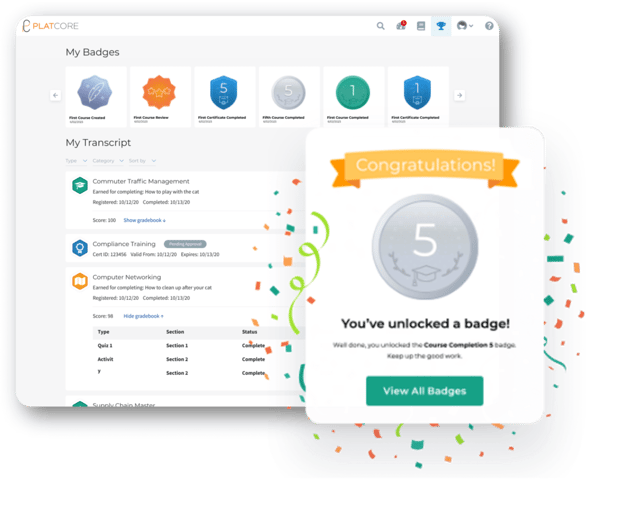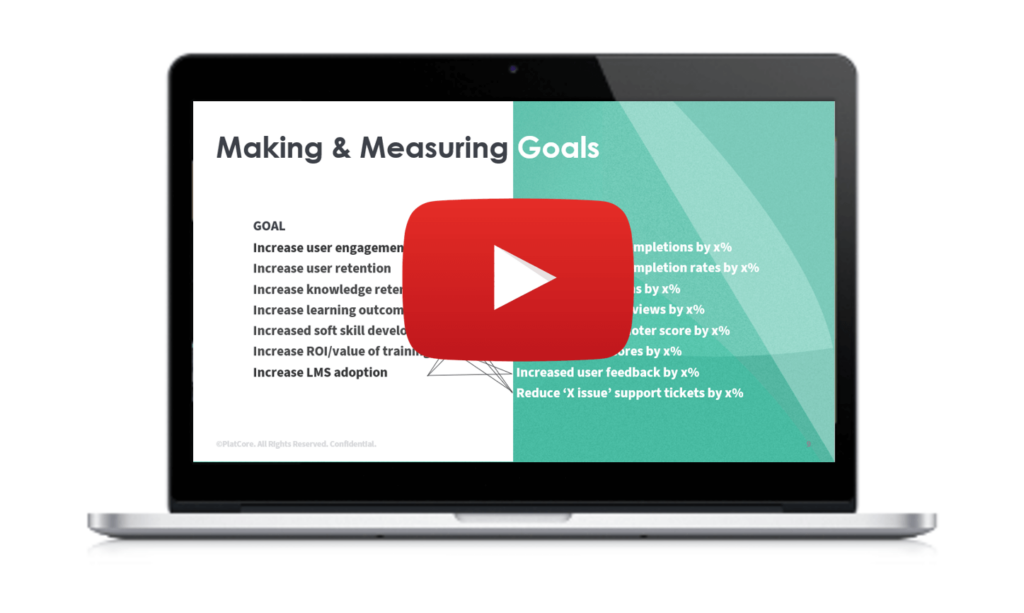Keeping learners engaged and motivated in the fast-paced world of education and corporate training is a constant challenge. As technology evolves, so does the approach to learning. One such innovative approach gaining traction is the integration of gamification into Learning Management Systems (LMS).
Gamification brings a sense of fun, competition, and achievement to the learning experience, resulting in a host of benefits that impact user engagement, retention, learning outcomes, and even the ROI of training initiatives.
For great tips on how to get started with gamification, please watch our latest demo.
5 Key Benefits of Gamification
1. Increased Learner Engagement
Engaging learners is a perpetual struggle for educators and trainers alike. Traditional methods often fall short, but gamification has proven to be a game-changer.
Incorporating game elements like points, badges, and leaderboards into LMS modules ignites a sense of competition and achievement. According to a study by Gartner[1], gamified activities can increase engagement rates by up to 60%, transforming a once monotonous learning process into an exciting journey.
By gathering more learning data, (and particularly with connected data) Learning Management Systems continue to attract learners with relevant content. This ensures that learners receive content and challenges that align with their interests and needs, resulting in a more engaging learning experience.
2. Increase Knowledge Retention
A key challenge for any learning program is retaining the information learned. Gamification tackles this problem head-on. A more immersive learning environment allows learners to interact with the content actively. When learners actively participate in learning (for example interactive quizzes, simulations, challenges, or earning achievements) they tend to remember the content more effectively.
This hands-on approach has been linked to improved knowledge retention and a deeper understanding of the subject matter. Research from the Journal of Educational Technology Systems[2] suggests that gamified learning experiences can lead to a 9% increase in knowledge retention compared to traditional methods.
3. Increase Learning Outcomes
The ultimate goal of any learning initiative is to enhance the learners' knowledge and skills. Gamification not only enhances engagement and retention but also amplifies the effectiveness of learning. A case study conducted by the eLearning Industry[3] demonstrated that incorporating gamification elements into an LMS resulted in a 20% increase in learning outcomes compared to non-gamified counterparts.
Furthermore, the ability to track progress and monitor achievements through leaderboards or progress bars fosters a sense of accomplishment and encourages learners to strive for continuous improvement.
4. Increased Soft Skill Development
While technical knowledge is essential, the development of soft skills is equally important. Gamification enables learners to step outside of learning requirements to practice and refine skills such as problem-solving, critical thinking, and teamwork.
The interactive nature of games creates a safe space for learners to experiment and learn from their mistakes, which ultimately translates to real-world application. A study by the Association for Talent Development[4] found that gamified training programs led to a 37% increase in soft skill development.
5. Increase ROI/Value of Training
Investing in training programs requires a substantial allocation of resources. Organizations are always on the lookout for methods that ensure a solid return on investment (ROI). The incorporation of gamification in LMS can lead to a more engaged, skilled, and motivated workforce.
This can, in turn, enhance overall productivity and efficiency, contributing to a significant ROI. A recent study [^5] highlighted that companies using gamified LMS experienced an 11% increase in revenue per employee.
In conclusion
Integrating gamification into Learning Management Systems is a transformative approach that redefines how learners engage with educational content. By focusing on elements like user engagement, retention, learning outcomes, and even the ROI of training, gamification emerges as a powerful tool that benefits learners, educators, and organizations alike.
Embracing this innovative approach promises not only a more enjoyable learning journey but also a more effective and impactful one.
Ready to get started?
Contact our sales team or see more examples in an on-demand webinar.
Sources:
- Gartner. (2014). Gamification Trends: What’s Real and What’s Hype in 2014. Retrieved from link
- Hamari, J., Koivisto, J., & Sarsa, H. (2014). Does Gamification Work? -- A Literature Review of Empirical Studies on Gamification. Proceedings of the Annual Hawaii International Conference on System Sciences. doi:10.1109/HICSS.2014.377
- eLearning Industry. (2015). How Gamification Increases Learning Outcomes.
- Association for Talent Development. (2019). Science Says Using Gamification Can Increase Learner Engagement.
- TalentLMS. (2018). The Gamification of eLearning: Why Does It Work?


